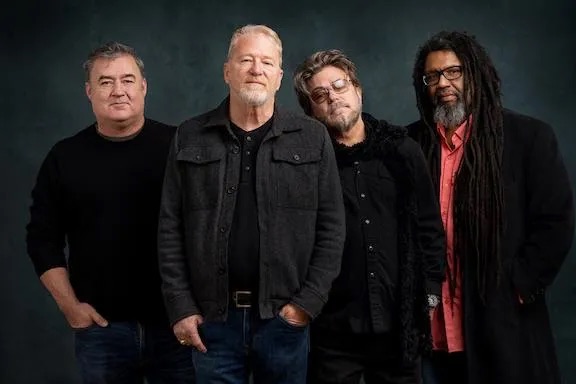Review: Cracker @ Middle East 1/19
Photo Credit: Jason Thrasher
Review by Jacob Risch
It’s 6:45 p.m. on a rainy Sunday night in Cambridge, and I’m running late. As I wandered around the basement of the Middle East in Cambridge, I noticed the crowd (as well as the band) was almost entirely Gen X’ers. After a bit, the already dim lights went down further, and Cracker came on stage. I had no idea what to expect, but from the first song, they hooked me. Cracker consistently sounds better live than in the studio. They were formed in 1990 by lead singer David Lowry and lead guitarist Johnny Hickman. Likely the only band to open for both the Grateful Dead and the Ramones, for 35 years they’ve played a style of rock that few bands can replicate. They live somewhere between 90’s college rock, outlaw country, grunge, and folk. Their jangly guitars and tongue-in-cheek lyrics brought me back to memories of what came out of my dad’s car radio on a Saturday morning in the early aughts.
While Cracker’s lineup may seem unassuming initially, they are each masters of their role. Their cohesion makes the band much stronger than the sum of its parts. Lowry is perfectly suited to his lead vocalist and rhythm guitarist role. He uses wit and humor to engage the audience, at one point complimenting a woman in the front on her clapping skills while discouraging the rest of the audience from clapping. More than his wit, his voice makes Cracker’s performance impressive. When he broke into the chorus of my favorite Cracker song, “Low,” I was shocked by how well his voice matched a 32-year-old record. He was humble throughout the set, alternating between cracking jokes and praising the other band members.
Lead guitarist Johnny Hickman is precisely what I want in a lead guitarist. Wearing what I can only describe as a Hank Williams Jr.-esque fit, he alternated between searing, stadium rock guitar solos, indie rock riffs, and even, at one point, a harmonica solo. Like Cracker’s style, his guitar playing is a microcosm of sounds, blending punk rock rhythms with Bakersfield country and So-Cal surf guitar. His energy was matched (and maybe exceeded) by guest violinist Anne Harris. Lowry described her and the band meeting on a “band blind date” where Lowry heard Harris play solo at a festival and eventually invited her to practice with the band. Her performance brought an element to the show that set it apart from a usual four-piece rock band. Each of her violin solos earned raucous applause, and her accompaniment filled out the sound of the band. Cracker is already a boisterous band, and adding a violinist to the mix helped them lean into an almost shoegaze sound that at times reminded me of a mix between a bluegrass band, My Bloody Valentine, and John Cale’s work in the Velvet Underground. I thoroughly enjoyed Harris’ performance, and if she isn’t already, she should stay with Cracker for future tours and recordings.
Rounding out the band was a rhythm section of Bryan Howard on bass and Carlton Owens on drums. Although Howard was quiet and restrained for most of the show, his bass lines were energetic and propulsive. Lowry praised his playing as so complex that it sounds like he’s using “imaginary notes.” His backing vocals fleshed out the band’s sound on some of their more stadium rock-style songs. Owens showed his chops by keeping immaculate time and adapting to the wide variety of sounds that Cracker had to offer.
As the show ended, I reflected on what this band meant to me. Is my enjoyment of Cracker entirely removed from the nostalgia their sound evokes within me? No. Will they ever truly recreate that feeling of apathetic optimism that I love about their early college/slacker rock aesthetic? Probably not, especially if they continue releasing music that leans into a familiar, well-worn path of roots rock they’ve seemed to inhabit. That doesn’t mean I’m going to stop listening. Their performance convinced me that this band has something to offer. Even if college rock is no longer Cracker’s sound or even the sound that pervades modern campuses, it has a special place in history and deserves attention. Despite the age of its members and audience, Cracker is true to its roots as a “college band.” They fit in perfectly coming out of a speaker on a quad while a frisbee gets tossed around or listening in a concrete-walled dorm on a lazy Sunday afternoon. They capture that transition between teen angst and the newfound freedom of adulthood in a way that makes them timeless.
